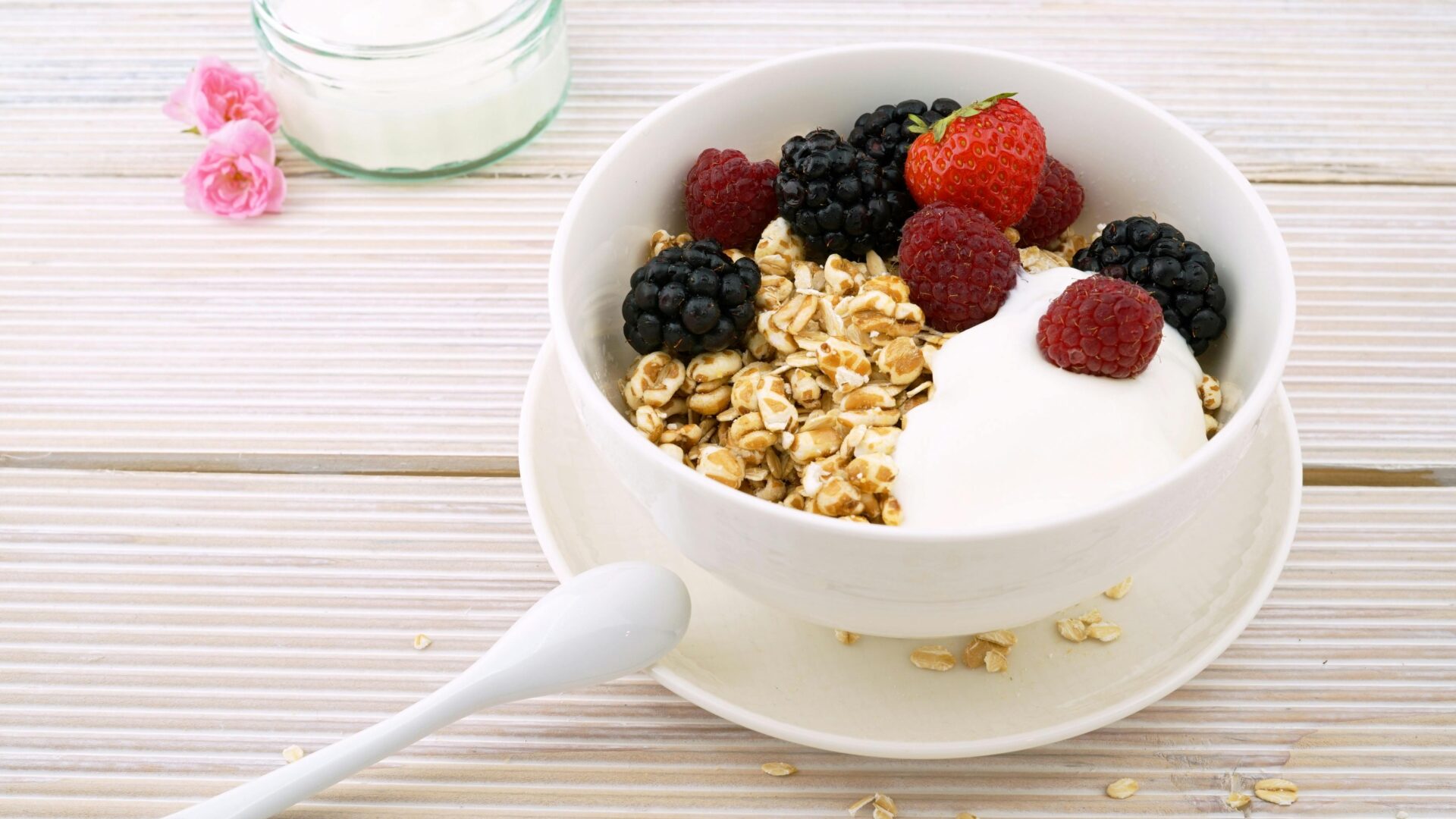Pre- and probiotics are on everyone's lips, literally. These beneficial microorganisms promise a variety of health benefits, from better digestion to a stronger immune system. But what exactly are probiotics and how do they work? In this article, we explain what they are, how they work and how you can use them to improve your health.
What are probiotics?
Probiotics are living microorganisms, usually bacteria, but also yeasts, which can provide health benefits when consumed in appropriate amounts. These ‘good’ bacteria are part of our body’s complex ecosystem, known as the microbiome, which is mainly found in the gut.
The word probiotic comes from the Greek and means “for life”. These microorganisms contribute to the health of the human body in many ways, for example by supporting the balance of the intestinal flora, improving digestion and strengthening the immune system.
The microbiome: An ecosystem within us
The human microbiome refers to the totality of all microorganisms that live in and on our bodies. The skin has its own microbiome, as does the gut. It includes bacteria, viruses, fungi and other microbes. Although some of these microorganisms can be pathogenic, most of them play a crucial role in our health. The human gut is particularly rich in microorganisms, where these little helpers can aid digestion, boost the immune system and even influence our mood and mental health.
The gut microbiome, by far the largest part of the human microbiome, is essential for digestion as it helps to break down food that the human body cannot digest on its own. It produces important vitamins and protects against pathogens. In addition, there is growing evidence that the microbiome plays a role in the prevention and treatment of conditions such as diabetes, obesity, inflammatory bowel disease and even mental health conditions such as depression.
A varied, balanced diet, rich in fibre, pre- and probiotic foods, supports a healthy microbiome. Lifestyle factors such as sufficient sleep, regular exercise and avoiding excessive alcohol consumption and antibiotics also help to maintain it.
The different types of probiotics
There are different strains of probiotics, each of which has different health benefits. The two most common types are:
- Lactobacillus: This strain is mainly found in yoghurt and other fermented foods. It can help with diarrhoea and could support people with lactose intolerance.
- Bifidobacterium: Found in some dairy products, this strain helps relieve the symptoms of irritable bowel syndrome (IBS) and other conditions.
Probiotics occur naturally in fermented foods, but can also be taken as food supplements in the form of capsules, tablets or powders. Their effect, safety and quality can vary depending on the strain and product.
By taking probiotics, you are directly adding live microorganisms to your microbiome. This can help maintain or restore the balance of microflora in the gut, which in turn can improve overall health and well-being.
Prebiotics and probiotics
Prebiotics are a type of fibre that the human body cannot digest. They serve as a food source for the good bacteria (probiotics) in our gut. By promoting the growth and activity of these beneficial bacteria, prebiotics play a crucial role in the health of our microbiome and therefore our overall health.
In contrast to probiotics, which are living strains of bacteria, prebiotics are indigestible carbohydrates. They are mainly found in fibre, which can be found in many types of fruit and vegetables, whole grains and pulses. Prebiotic foods include chicory root, garlic, onions, leeks, asparagus and bananas.
Prebiotics and probiotics work hand in hand to promote the health of the digestive system. Whilst probiotics enrich the gut flora with beneficial bacteria, prebiotics ensure that these bacteria have the food they need to grow and work effectively. This synergistic relationship not only supports digestive health, but also the immune system, mental health and can even help with body weight management.
A healthy balance of prebiotics and probiotics in the diet is crucial for maintaining a healthy microbiome, which in turn plays a key role in overall health.
The history of probiotics
The idea that certain microorganisms could have health-promoting properties is by no means new. In fact, the roots of probiotics go back to the early 20th century, if not further. Their history is closely linked to the understanding of the human microbiota and the development of microbiology.
The discovery and historical use
The modern history of probiotics begins with the Russian scientist and Nobel Prize winner Élie (Ilja) Metchnikoff, who lived at the beginning of the 20th century. Metchnikoff was one of the first to postulate the potential health benefits of certain microorganisms. He theorised that the longevity of Bulgarian farmers was partly due to their regular consumption of fermented dairy products, which are rich in lactobacilli.
Metchnikoff’s work laid the foundation for what we know today as probiotics. His hypothesis that the balance of microflora in the gut could directly influence health and longevity was way ahead of its time.
Over the course of the 20th century, scientific research on probiotic bacteria increased. Researchers began to identify specific strains and document their potential health benefits. This led to the development of the first probiotic food supplements and the increased use of probiotics in the food industry.
From traditional foods to modern supplements
The use of fermented foods, which naturally possess probiotic properties, has a long tradition spanning many cultures and civilisations. From sauerkraut in Germany to kefir and yoghurt in parts of Eastern Europe and the Middle East to miso in Japan, many of these traditional diets instinctively incorporate the health benefits of probiotics.
With growing scientific interest and understanding, probiotics have taken a firm place in the health consciousness of modern society. The development of probiotics as dietary supplements now makes it possible to consume specific strains for specific health benefits, regardless of cultural dietary habits, bringing together traditional knowledge and modern science.
How do probiotics work?
To understand how probiotics can impact our health, it’s important to first take a look at the human microbiome. The microbiome is made up of trillions of microorganisms, including bacteria, viruses, fungi and other microbes that inhabit our bodies, especially the gut. These microorganisms play a crucial role in digestion, nutrient absorption, immune function and even mental health.
The mechanism in the body
Probiotics work by modulating the microbiome, specifically by supporting or restoring the balance of gut flora. Here are some key ways they do this:
- Competition with harmful microbes: Probiotics can help inhibit the growth of harmful bacteria by competing for food and attachment sites on the intestinal wall.
- Strengthening the intestinal barrier: Some probiotics promote the production of mucus and other substances that strengthen the intestinal wall and protect against the invasion of harmful microbes.
- Support for the immune system: Probiotics interact with the immune cells of the gut to promote a healthy immune response. This can help fight infections and reduce inflammation.
- Production of useful substances: Probiotic bacteria can produce vitamins and short-chain fatty acids, which are essential for the health of the gut and the entire body.
It is important to note that the effects of probiotics are strain-specific. This means that not all probiotics have the same health benefits. Research is focused on understanding which strains are most effective for specific health conditions or goals.
The microbiome and health
The balance between the different microorganisms in the gut is crucial to our health. An imbalance, known as dysbiosis, can lead to a variety of problems, including digestive disorders, inflammation, autoimmune diseases and even mental health issues. By maintaining a healthy microbiome, probiotics can help minimise these risks and promote overall health.
In recent years, research has also begun to investigate the role of the microbiome and probiotics in the prevention and treatment of conditions outside the gut, including skin diseases, allergies and respiratory infections.
The ability of probiotics to influence different aspects of our health makes them a fascinating area of current research and a potential tool for preventive health measures and therapeutic interventions.
The health benefits of probiotics
Probiotics are known for their many positive effects on health. By supporting the microbiome, they help to promote a healthy digestive system, boost the immune system and can even influence mental health. Below we look at some of the key health benefits of probiotics in more detail.

Improvement of digestive health
Probiotics are perhaps best known for promoting healthy digestion. They can help to alleviate a range of digestive problems, including:
- Diarrhoea: Both antibiotic-associated diarrhoea and travel-related diarrhoea can be reduced by probiotics. Certain strains of probiotics, such as Lactobacillus rhamnosus and Saccharomyces boulardii, have been shown to be effective in studies.
- Irritable Bowel Syndrome (IBS): Probiotics can alleviate some symptoms of irritable bowel syndrome, such as bloating, cramps and irregularity.
- Inflammatory bowel diseases: Some research suggests that probiotics can be supportive in diseases such as Crohn’s disease and ulcerative colitis.
Strengthening the immune system
Probiotics play an important role in strengthening the immune system. By supporting the balance of the microbiome and maintaining the integrity of the intestinal mucosa, they help to ward off pathogenic microorganisms. Some probiotics can increase the production of natural antibodies and the activity of T lymphocytes and natural killer cells, leading to an improved immune response.

Contribution to mental health
The concept of the “gut-brain axis” describes the bidirectional communication between the gut and the brain. Probiotics can positively influence this relationship by affecting neurochemical and inflammatory changes associated with various mental health conditions. Studies have shown that certain strains of probiotics can improve symptoms of anxiety, depression and stress-related disorders.
Further health benefits
The research on probiotics is wide-ranging and covers a variety of health aspects, including:
- Reduction of allergic reactions: Some studies suggest that probiotics can reduce the frequency and severity of allergic conditions such as eczema in children.
- Skin health: Probiotics may also play a role in treating certain skin conditions, including acne and rosacea, by reducing inflammation and strengthening the skin barrier.
- Weight management: There is evidence that certain strains of probiotics can affect body weight and body fat percentage, although results vary and require further research.
It is important to emphasise that the effectiveness of probiotics depends on many factors, including the type of probiotic, the dose and the person’s individual health status. Not everyone will experience the same benefits from probiotics, and some people may even experience side effects.
Natural sources of probiotics
Probiotics are found in a variety of fermented foods and beverages that are produced by the natural activity of bacteria and yeasts. These microorganisms ferment the sugars in foods, producing acids or alcohol in the process, which not only preserves but also promotes probiotic cultures. Here are some of the best natural sources of probiotics that you can incorporate into your diet:

Foods and drinks that contain probiotics
- Yoghurt: One of the best known and most widely used carriers of probiotics. Look for yoghurts that contain ‘live and active cultures’ to ensure you’re getting the benefits of probiotics.
- Kefir: A fermented milk resulting from the fermentation of milk with kefir grains. Kefir is rich in Lactobacillus and Bifidobacterium strains and is considered to be even more potent than yoghurt.
- Sauerkraut: Fermented cabbage that is not only rich in probiotics, but also vitamins B, C and K. For maximum health benefits, choose raw sauerkraut that has not been pasteurised, as the pasteurisation process can kill most live bacteria.
- Kimchi: A spicy, fermented Korean dish that usually consists of cabbage and other vegetables. Kimchi is rich in the probiotic strains Lactobacillus kimchii as well as other Lactobacillus species and bifidobacteria.
- Miso: A Japanese seasoning paste made from fermented soya beans that is often used in soups. Miso is a good source of several strains of probiotic bacteria.
- Tempeh: A fermented soya product that offers a firm, nutty alternative to tofu. The fermentation process produces probiotic benefits that make tempeh a nutritious addition to any meal.
- Kombucha: A fermented tea made by fermenting black or green tea with a culture of bacteria and yeasts. Kombucha is known for its health-promoting properties, including the provision of probiotics.
These foods and drinks are not only delicious, but also offer an easy way to add probiotics to your diet. However, it is important to note that probiotic content can vary depending on the manufacturing process, storage and individual product variations.
Tips for consumption:
- Variation: Incorporate a variety of fermented foods into your diet to consume a broad spectrum of probiotic strains.
- Moderation: Start slowly and observe how your body reacts to the introduction of probiotic foods, especially if you are not used to them.
- Quality: Choose organic products whenever possible and pay attention to the labelling regarding live cultures.
By integrating probiotic foods into your daily diet, you can reap the many health benefits of these “good” microorganisms.
Probiotics as a dietary supplement
While consuming probiotic-rich foods is a great way to support your gut health, sometimes it’s not enough to fulfil certain health needs. This is where probiotics as dietary supplements come into play. They provide a concentrated source of specific probiotic strains and can be a convenient option for those who want to specifically support their gut flora.
Overview of supplements
Probiotic supplements are available in various forms, including capsules, tablets, powders and liquid formulations. They may contain one or more probiotic strains in varying concentrations. Choosing the right supplement depends on your individual health goals and needs.
Some of the most common probiotic strains in supplements are:
- Lactobacillus acidophilus: Helps with digestion and can boost immunity.
- Bifidobacterium bifidum: Supports the digestion of dairy products and plays a role in maintaining healthy intestinal flora.
- Saccharomyces boulardii: A type of yeast that can be helpful in the prevention and treatment of diarrhoea.
What to consider when buying probiotic supplements
- Strain and Potency: Pay attention to the specific strains and the CFU (Colony Forming Units) number, which indicates the potency of the supplement. A higher CFU number does not necessarily mean a better product, but it may indicate the strength of the supplement.
- Storage: Some probiotics need to be refrigerated to maintain their effectiveness, while others can be stored in a stable form at room temperature. Check the storage instructions to make sure you are storing the supplement correctly.
- Expiry date: Probiotic supplements lose their effectiveness over time. Make sure that the product you buy has a clearly labelled expiry date and that it is still far enough in the future.
- Quality seals: Look for products that have been tested by third parties for purity and potency. Quality seals from independent organisations can be an indicator of a reliable product.
It is also advisable to speak to a healthcare provider before taking probiotic supplements, especially if you are pregnant, breastfeeding, have an existing health condition or are already taking medication.
Probiotic supplements can be a valuable addition to a healthy diet and lifestyle by providing targeted support for specific areas of health. However, as with any supplement, it is important to make informed decisions and choose products that meet individual needs.
Possible side effects and risks
Probiotics are generally considered safe for the majority of the population, but as with any dietary supplement or food, they can have side effects, especially in people with certain health conditions or if used improperly.
Who probiotics are not suitable for
- People with a weakened immune system: People with a weakened immune system, for example due to HIV/AIDS, cancer treatments or taking immunosuppressants, should consult their doctor before taking probiotics, as there is a potential risk of infection.
- People with serious illnesses: Those suffering from serious illnesses or acute conditions should also exercise caution. In rare cases, probiotic bacteria can become pathogenic and cause infections.
Pregnant and breastfeeding women: Although probiotics are often considered safe for pregnant and breastfeeding women, it is important to consult a doctor beforehand, as research in this area is not yet conclusive.
Common side effects
When taking probiotics for the first time or when increasing the dose, some people may experience mild digestive disturbances, including:
- Flatulence
- Bloated belly
- Soft stools or diarrhoea
These side effects are usually mild and temporary. They often result from the body’s adaptation to the new microorganisms in the intestine. If these symptoms persist or become severe, it is advisable to reduce the intake or consult a doctor.
Tips for safe use
- Start with a low dose: To minimise potential side effects, it can be helpful to start with a lower dose and gradually increase it until the desired effect is achieved.
- Pay attention to your body’s reaction: Everyone reacts differently to probiotics. Observe how your body reacts to the intake and adjust the dose accordingly.
- Quality and purity: Choose probiotics of high quality and purity to minimise the risk of contamination and unwanted side effects.
Whilst probiotics can offer many benefits for many people, it’s important to be aware of the potential risks and seek professional advice if you have any concerns. Here’s how you can make sure you maximise the benefits of probiotics without putting your health at risk.
Conclusion
Probiotics, the ‘good’ microorganisms, are an essential component of human health, particularly in relation to the gut microbiome. They are available in various forms, including natural sources such as fermented foods and as dietary supplements, and offer a range of health benefits:
- Improving digestive health: probiotics can help prevent and treat digestive disorders such as diarrhoea and irritable bowel syndrome.
- Strengthening the immune system: They support the immune system by promoting the production of antibodies and helping to ward off pathogenic bacteria.
- Promoting mental health: By influencing the gut-brain axis, probiotics can help to improve mental health.
- Other health benefits: These include aiding in the treatment and prevention of skin conditions, reducing allergic reactions and possibly aiding in weight management.
Despite their many benefits, probiotics are not suitable for everyone. People with weakened immune systems, serious illnesses and pregnant and breastfeeding women should consult a doctor before taking them. Side effects are usually mild and temporary, but it is important to pay attention to your body’s signals and seek medical advice if you have any concerns.
When choosing probiotics, it is crucial to look for quality and purity, whether in the form of supplements or by consuming fermented foods. A balanced diet rich in probiotic foods, together with a healthy lifestyle, can provide the best conditions for realising the benefits of probiotics.
Frequently asked questions
Probiotics are live microorganisms that, when consumed in sufficient quantities, can provide health benefits.
Prebiotics, on the other hand, are substances, usually certain types of fibre, that promote the growth and activity of beneficial microorganisms in the gut. In short, probiotics are the good bacteria themselves, while prebiotics are their food.
The effects of probiotics can vary, depending on factors such as the specific strain of probiotic, the dose and the individual’s state of health. Some people notice improvements in their digestive health within a few days, while for others it can take several weeks before significant changes are noticeable.
Some studies suggest that certain strains of probiotics can affect body weight and body fat percentage. However, the results are mixed and probiotics should not be seen as a miracle cure for weight loss. A balanced diet and regular exercise are still the most effective methods for weight loss.
Not all fermented foods contain live probiotics. The probiotic content depends on the type of fermentation, storage and processing. Foods that have been pasteurised usually do not contain live probiotics, as the pasteurisation process kills the bacteria.
While probiotics are generally safe, excessive consumption, especially in supplement form, can lead to side effects such as bloating, discomfort and diarrhoea. It is important to follow the recommended dosage and speak to a healthcare provider if you are unsure.
Some benefits of probiotics, such as improving digestive health, can occur relatively quickly, but for long-term benefits it is often helpful to consume probiotics regularly. Continuous intake can help maintain the balance of intestinal flora.
Yes, the combination of prebiotics and probiotics, often referred to as ‘synbiotics’, can be particularly beneficial. Taking them at the same time ensures that the probiotic bacteria have a direct food source, which can promote their growth and activity in the gut. Many supplements and some foods already contain both to maximise the health benefits.
Some fermented foods provide a natural source of both probiotics and prebiotics, making them excellent options for promoting gut health. Examples include sauerkraut, kimchi and certain yoghurts. These foods contain live microorganisms (probiotics) and at the same time the fibre (prebiotics) that these bacteria need to thrive.
By incorporating prebiotic and probiotic-rich foods into your diet, you can nourish and support your microbiome, which can lead to improved digestive health and a strengthened immune system.
Mikrobiomforschung (Allergieinformationsdienst, 2018).
Depner, M. et al.: Maturation of the gut microbiome during the first year of life contributes to the protective farm effect on childhood asthma. In: Nat Med. 2020;26(11):1766-1775. doi:10.1038/s41591-020-1095-x.
Ling, Z. et al.: Altered fecal microbiota composition associated with food allergy in infants. In: Appl Environ Microbiol. 2014 Apr;80(8):2546-54. doi: 10.1128/AEM.00003-14. Epub 2014 Feb 14. PMID: 24532064; PMCID: PMC3993190.
Sender, R. et al.: Revised Estimates for the Number of Human and Bacteria Cells in the Body. In: PLoS Biol 2016 Aug 19;14(8):e1002533. doi: 10.1371/journal.pbio.1002533.


